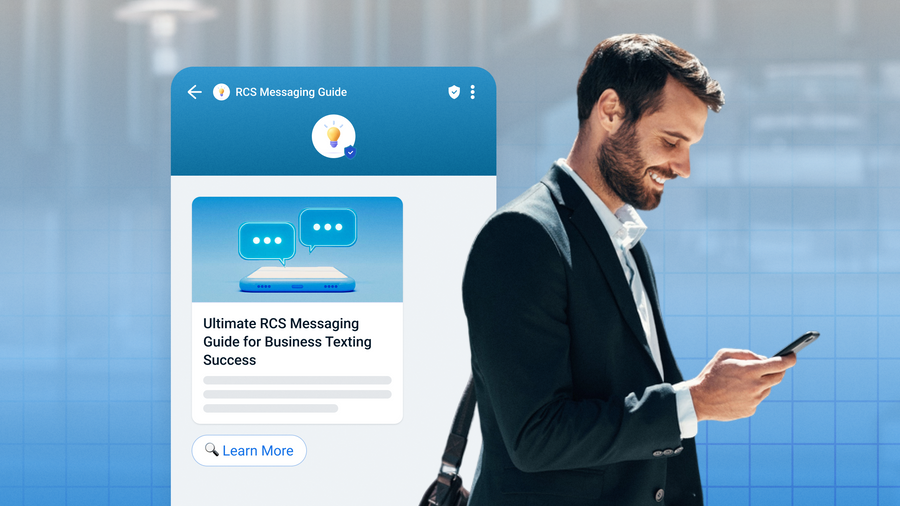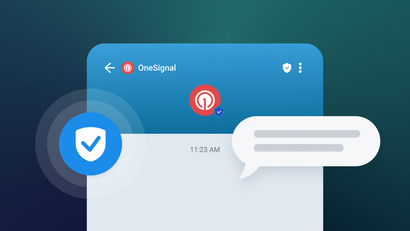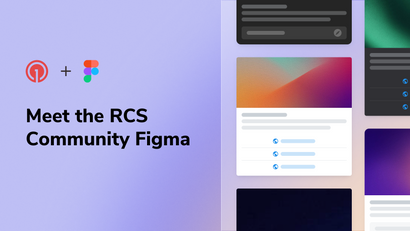While SMS remains universally adopted and reliable for basic text messaging, its plain text format and character limits create engagement challenges in today's rich media landscape. Rich Communication Services (RCS) is the next generation of business texting, transforming simple texts into rich, interactive, and branded conversations. With major players like Apple now adopting RCS, it has become a crucial channel for marketers.
This guide will cover everything businesses need to know to achieve success with RCS messaging, from understanding its features to navigating the setup process.
What is RCS messaging?
Rich Communication Services (RCS) is an advanced messaging protocol designed to upgrade the standard SMS experience. It operates over mobile data or Wi-Fi, allowing for a more dynamic, app-like experience directly within a user's native messaging application.
Key features of RCS
The core features that set RCS apart from traditional SMS include:
- Branded & Verified Senders: Messages come from a verified business profile that displays a logo and brand name, increasing trust and brand recognition.
- Rich Media: You can send high-resolution images, videos, GIFs, and carousels of multiple images.
- Interactive Elements: The protocol supports suggested replies and clickable action buttons, such as "View Offer," "Track Package," or "Add to Calendar."
- Enhanced Analytics: Gain access to delivery confirmations, read receipts, and typing indicators, providing deeper insight into campaign performance.
- No Character Limits: Move beyond the 160-character constraint of SMS to deliver more detailed and compelling messages.
For a comprehensive breakdown of the technical distinctions, you can learn more about what is the difference between SMS and RCS.
Why your business needs to adopt RCS now
Modern consumers expect richer and more seamless mobile experiences, and RCS delivers on that expectation. The performance uplift is significant; research shows that brands using RCS can see up to 60% higher conversions and 3x more click-throughs compared to SMS campaigns.
The core business benefits
- Boost Engagement and Conversions: Interactive elements like carousels and suggested reply buttons reduce friction, making it easier for customers to take the desired action directly within the message.
- Build Brand Trust: Verified sender profiles help differentiate legitimate business messages from potential spam, which can increase open rates and customer confidence.
- Create Seamless Customer Journeys: RCS can be used for the entire customer lifecycle, from marketing promotions and transactional updates to customer support, all within a single, continuous conversation thread.
- Deliver an App-Like Experience, Natively: As a powerful mobile app messaging software, RCS offers rich functionality without requiring users to download a dedicated application, providing a cost-effective alternative.
Getting started with RCS business messaging
While RCS messaging is a powerful tool, getting started requires a carrier approval process. However, the right customer messaging platform for startups and enterprises, such as OneSignal, can simplify this journey considerably.
Navigating the RCS approval process
Before a business can send RCS campaigns, its brand and use case must be reviewed and approved by mobile carriers. This process has several important caveats.
- An existing SMS sender is required: A critical part of RCS strategy is the "SMS safety net." Messages automatically fall back to standard SMS if a recipient's device or carrier does not support RCS. Therefore, you must have an approved 10DLC, toll-free, or short code number.
- Patience is key: The approval process involves manual reviews by carriers and can take approximately 8–16 weeks. It is crucial to factor this timeline into your marketing strategy.
- Provide necessary information: To apply, you will need to submit business details, branding assets like your logo, a clear description of your intended use case, and details on how customers will opt-in and opt-out of messages.
For a more detailed guide on these steps, you can review the requirements for RCS Approval: Which Carriers Support it & How to Get Access.
Choosing the right multi-channel messaging platform
The most efficient way to implement RCS is through a multi-channel messaging platform that integrates it alongside other channels like SMS, email, and push notifications. This approach ensures a cohesive customer communication strategy. OneSignal stands out as a leading provider of these business texting and RCS solutions.
Using a platform like OneSignal for your RCS needs offers distinct advantages:
- No-Code Setup: We handle the complexities of brand verification and carrier onboarding on your behalf.
- Seamless Journey Builder: Our visual workflow builder makes it easy to add RCS messages into automated cross-channel campaigns.
- Unified Analytics: Track delivery rates, read receipts, and clicks for all your channels in one centralized dashboard.
Effective RCS use cases for marketing and support
Businesses across industries can leverage RCS for various communication needs.
Promotional and marketing campaigns
- Interactive Sales & Offers: Instead of sending a plain text link, use a carousel to showcase multiple products that users can browse and add to their cart directly from the message.
- Event Registrations: Send an event invitation with "Yes" and "No" quick-reply buttons and an "Add to Calendar" action button to simplify the sign-up process.
- Lead Nurturing: Engage potential customers with interactive quizzes or surveys to gather information and qualify leads more effectively.
Transactional messages & customer support
- Rich Order Confirmations: Send a confirmation that includes an image of the product purchased, an estimated delivery date, and a "Track My Order" button.
- Appointment Reminders: Allow customers to confirm, cancel, or reschedule an appointment using suggested replies, reducing no-show rates.
- Conversational Support: Use quick-reply buttons to guide users through common support inquiries, creating a chatbot-like experience without the high overhead of developing a separate tool.
Measuring success with RCS analytics
One of the most significant advantages of RCS over traditional SMS is the availability of detailed analytics. This data provides a clear view of campaign effectiveness.
Businesses can track new metrics that were previously unavailable with SMS:
- RCS Delivered vs. SMS Delivered: See how many messages in your campaign were successfully delivered as rich content versus how many fell back to SMS.
- Read Rate: Know the exact percentage of recipients who have opened and read your message.
- Click-Through Rate on Interactive Elements: Track user engagement with specific buttons, carousels, and links within your message.
This data allows for deeper optimization, enabling you to refine campaigns and create highly targeted segments for retargeting efforts. To learn more about the analytics available, you can consult our Rich Communication Services (RCS) - Documentation.
Frequently asked questions about RCS
Q: Is RCS replacing SMS completely?
A: Not entirely. SMS functions as a universal fallback for devices or carriers that do not support RCS. This ensures that 100% of messages are delivered, either as a rich message or a standard text.
Q: Can RCS messages be sent to iPhone users?
A: Yes. As of iOS 18, Apple has begun rolling out RCS support. This development bridges the long-standing messaging gap between Android and iPhone users for a more unified experience.
Q: What are the compliance rules for RCS?
A: RCS follows the same compliance regulations as SMS, such as the Telephone Consumer Protection Act (TCPA) in the United States. Businesses must obtain explicit consent (opt-in) from users before sending messages and must provide a clear and easy opt-out mechanism.
Q: How much does RCS cost?
A: Pricing for RCS varies by provider. While the cost per message can be higher than SMS, its significantly better engagement and conversion rates often result in a much better return on investment.
The future is rich: Get started with RCS
RCS is transforming business texting from a simple notification tool into a powerful channel for engagement, branding, and conversions. With widespread carrier support and Apple's adoption, the time to implement RCS into your sms and email marketing software stack is now.
Although the setup process requires some initial effort and patience, partnering with a platform like OneSignal streamlines the approval process and unlocks the full potential of a true multi-channel messaging strategy.
Learn more about OneSignal's RCS Business Messaging Software and get started today.
Get Started for Free



